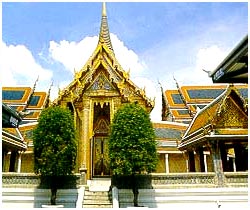Besides, the 'Ubosot' (Ordination Hall) is equally magnificent and bedecked with glazed tiles in five different colors. The doors and windows of the Ordination Hall, with mondop-shaped niches, are also decorated with glazed tiles in five colors. Moreover, unlike most Thai temples, where the Ubosot is perched alone on a square patio, the Ubosot of Wat Ratchabophit connects a large Wiharn with a circular courtyard. A huge gilded chedi, with a Lopburi-style Buddha image, sits between the two buildings.
 The Wihan is similar in architectural style as the Ordination Hall,
excepting the door and window panels, which are made of wood and depict
richly carved motifs. It houses the main Buddha image 'Phra Prathip
Warothai', an old Buddha image in the attitude of Subduing Mara and
three cabinets holding the Tripitaka carved on palm leaves. Apart from
the Ubosot and Wiharn, another major draw of the place is the chedi
behind the Ordination Hall. Built in Thai style, its upper part
enshrines Buddha's relics, installed in 1949 AD.
The Wihan is similar in architectural style as the Ordination Hall,
excepting the door and window panels, which are made of wood and depict
richly carved motifs. It houses the main Buddha image 'Phra Prathip
Warothai', an old Buddha image in the attitude of Subduing Mara and
three cabinets holding the Tripitaka carved on palm leaves. Apart from
the Ubosot and Wiharn, another major draw of the place is the chedi
behind the Ordination Hall. Built in Thai style, its upper part
enshrines Buddha's relics, installed in 1949 AD.The monastic quarters are located towards the south of the temple buildings and the west side holds a burial ground, dotted with small monuments and neat paths. Some of them owe their construction to King Rama V, while others saw erection by royal members of the later periods. Built in different shapes, such as Chedi, Prang and Wihan, these buildings are patterned in different architectural styles like Thai, Khmer and Gothic. All these buildings evoke elements of the gothic, which otherwise finds subtle depiction in other parts of the temple.



